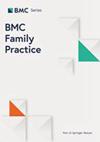在初级保健中使用非药物干预措施管理常见慢性病的共同障碍和促进因素:综述
IF 3.2
3区 医学
Q1 MEDICINE, GENERAL & INTERNAL
引用次数: 0
摘要
非药物干预被推荐用于慢性疾病的预防和管理,但在临床实践中却使用不足。了解使用非药物干预措施的障碍和促进因素有助于在初级保健中实施非药物干预措施。我们旨在通过综述来识别和总结在初级医疗中使用非药物干预治疗常见慢性病的常见障碍和促进因素。我们纳入了定性和定量的综述,这些综述使用了系统的流程或方法来研究在初级医疗机构使用非药物干预措施进行慢性病预防和管理的障碍和促进因素。我们检索了从开始到 2022 年 9 月的 5 个电子数据库(PubMed、Cochrane 系统性综述数据库、EMBASE、PsycInfo 和 CINAHL)。两位作者独立筛选综述。一位作者根据《实施研究综合框架》(CFIR)(以及相关的《理论领域框架》[TDF])提取数据并进行演绎编码。第二位作者对 10%的提取数据和编码进行验证。使用 CFIR 和 TDF 对数据进行专题综合。一位作者使用修改后的 AMSTAR 2 工具对纳入综述的方法学质量进行评估,其中 10%由第二位作者验证。我们评估了所纳入综述中主要研究之间的重叠情况。从 5324 条记录中,我们纳入了 25 篇综述,其中的数据主要来自患者。总体而言,在 4 个 CFIR 领域(创新、外部环境、内部环境和个人)和所有 TDF 领域中确定了 130 个次主题(71 个障碍和 59 个促进因素)。在创新适应性、创新成本、创新相对优势、当地态度、外部压力、当地条件、关系网、可用资源以及获取知识和信息等 CFIR 构建中,确定了共同的障碍和促进因素次主题。在 TDF 领域,我们为知识、技能、环境背景和资源、对后果的信念、强化和情感确定了重要的障碍和促进因素次主题。我们对综述进行了归纳总结,从而对在初级保健中使用非药物干预措施预防和管理慢性疾病的常见障碍和促进因素有了新的认识。所发现的因素可为制定可推广的实施干预措施提供参考,从而同时提高多种非药物干预措施的吸收率。本研究已在 PROSPERO 注册(CRD42022357583)。本文章由计算机程序翻译,如有差异,请以英文原文为准。
Common barriers and enablers to the use of non-drug interventions for managing common chronic conditions in primary care: an overview of reviews
Non-drug interventions are recommended for chronic condition prevention and management yet are underused in clinical practice. Understanding barriers and enablers to using non-drug interventions may help implement non-drug interventions in primary care. We aimed to conduct an overview of reviews to identify and summarise common barriers and enablers for using non-drug interventions for common chronic conditions in primary care. We included qualitative and quantitative reviews that used systematic process or methods to examine barriers and enablers to using non-drug interventions for chronic condition prevention and management in primary care settings. We searched 5 electronic databases (PubMed, Cochrane Database of Systematic Reviews, EMBASE, PsycInfo and CINAHL) from inception to September 2022. Two authors independently screened reviews. One author extracted and deductively coded data to Consolidated Framework of Implementation Research (CFIR) (and where relevant, Theoretical Domains Framework [TDF]). A second author validated 10% of extracted data and coding. Data was synthesised thematically using CFIR and TDF. One author assessed the methodological quality of included reviews using a modified AMSTAR 2 tool, with 10% validated by a second author. We assessed overlap between primary studies in included reviews. From 5324 records, we included 25 reviews, with data predominately from patients. Overall, 130 subthemes (71 barrier and 59 enabler) were identified across 4 CFIR domains (Innovation, Outer Setting, Inner Setting, and Individuals), and all TDF domains. Common barrier and enabler subthemes were identified for CFIR constructs of Innovation Adaptability, Innovation Cost, Innovation Relative Advantage, Local Attitudes, External Pressure, Local Conditions, Relational Connections, Available Resources, and Access to Knowledge and Information. For TDF domains, important barrier and enabler subthemes were identified for Knowledge, Skills, Environmental Context and Resources, Beliefs about Consequences, Reinforcement, and Emotion. We synthesised reviews to provide new insight into common barriers and enablers for using non-drug interventions to prevent and manage chronic conditions in primary care. The factors identified can inform the development of generalisable implementation interventions to enhance uptake of multiple non-drug interventions simultaneously. This study was registered in PROSPERO (CRD42022357583).
求助全文
通过发布文献求助,成功后即可免费获取论文全文。
去求助
来源期刊

BMC Family Practice
医学-医学:内科
CiteScore
3.20
自引率
0.00%
发文量
0
审稿时长
4-8 weeks
期刊介绍:
BMC Family Practice is an open access, peer-reviewed journal that considers articles on all aspects of primary health care research. The journal has a special focus on clinical decision making and management, continuing professional education, service utilization, needs and demand, and the organization and delivery of primary care and care in the community.
 求助内容:
求助内容: 应助结果提醒方式:
应助结果提醒方式:


